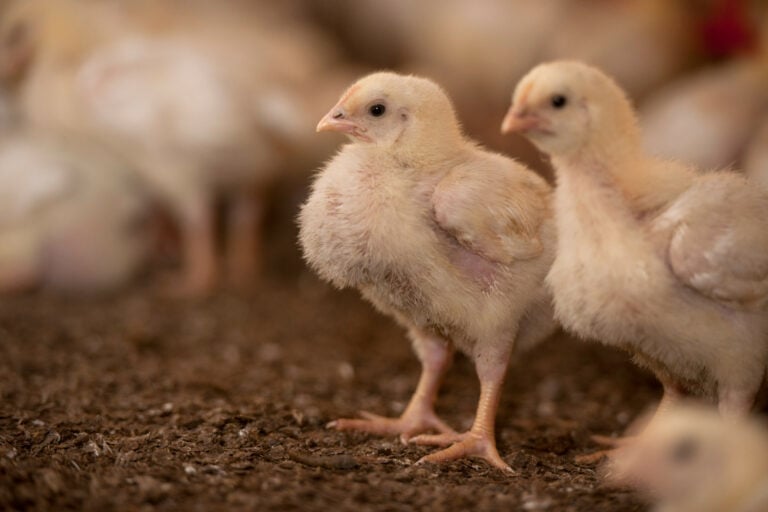October 29, 2025 | 13:52 GMT +7
October 29, 2025 | 13:52 GMT +7
Hotline: 0913.378.918
October 29, 2025 | 13:52 GMT +7
Hotline: 0913.378.918

To explore the challenges of achieving higher welfare standards, the Royal Veterinary College interviewed industry representatives familiar with the Better Chicken Commitment, focusing on why transitioning to slower-growing broilers remains particularly difficult. Photo: Mark Pasveer.
Longstanding concerns about the welfare of conventional broiler chickens used to produce chicken meat have led to commitments by 104 UK retailers, restaurants, and food service providers, that by 2026 their poultry products will meet the Better Chicken Commitment requirements, including production using slower-growing strains that demonstrate better welfare outcomes. However, a wide-scale transition to production using these strains has not occurred in the UK.
Economic pressures, environmental concerns, and a disconnect between consumer purchasing habits and awareness have slowed progress, despite growing interest in improved welfare practices.
While chicken is the most widely consumed meat in the UK, only a small percentage is produced under higher welfare standards. The Better Chicken Commitment establishes science-based welfare guidelines for broiler chickens, addressing concerns related to fast growth rates, housing conditions, stocking density, and slaughter practices to promote industry-wide improvements.
To explore the challenges of achieving these higher welfare standards, the Royal Veterinary College interviewed 30 industry representatives familiar with the Better Chicken Commitment, focusing on why transitioning to slower-growing broilers remains particularly difficult.
Co-funded by the Animal Welfare Foundation and the British Poultry Council, the study revealed a broad agreement that slower-growing chicken strains experience better welfare than their conventional fast-growing counterparts when raised under the same conditions. However, concerns about increased economic and environmental costs posed significant barriers, alongside uncertainties about consumer willingness to pay for welfare improvements.
Perspectives on sustainability shaped differing opinions on feasible solutions. Retailers and industry representatives prioritised reducing carbon emissions to meet net-zero targets, viewing cheaper chicken as essential to meeting consumer demand and preventing a shift toward low-welfare imports.
Consequently, they deemed slower-growing broilers financially and environmentally impractical, advocating instead for improvements in conventional broiler welfare or the use of more efficient intermediate-growth strains as a compromise.
However, welfare charities, scientists, and assurance schemes took a broader view of sustainability, incorporating concerns such as water pollution, biodiversity, and socio-economic factors. They argued that animal welfare should be considered an integral part of sustainable food production rather than a competing priority.
Additionally, they did not believe consumer purchases reflected true preferences due to consumer confusion about production practices and labelling. These participants emphasized the need for transformative change within the food system, encompassing ways to reduce economic and environmental costs associated with slower-growing broilers, improved clarity in labeling and marketing to better align consumer purchasing with preferences, and a ‘less but better’ approach to chicken consumption.
Dr Siobhan Abeyesinghe, associate professor in animal behaviour and welfare science at the Royal Veterinary College and lead author of the paper, said: “These results show that we urgently need a better understanding of UK consumer expectations about broiler welfare and welfare labelling, and how they prioritise welfare in relation to environmental costs and price. This is a major missing piece of the puzzle that stakeholders currently face for realistically evaluating both the importance and feasibility of different improvements to the welfare of over a billion chickens each year. If welfare improvements are to be market driven, then welfare gains must be significant for the additional costs involved, valued by consumers and balanced against other sustainability goals.”
The issue is a complex one – Tesco has announced the completion of a major enhancement in its poultry welfare operations. While not a signature to the Better Chicken Commitment, Tesco will provide additional financial support to it suppliers and farmers of around £50 million (€59 million) a year to help implement the enhancements in chicken welfare and associated costs.
The enhancements represent a major step-up in welfare standards across the industry and build on Tesco’s existing higher welfare brands, which already include more space for birds to roam. The move will also ensure birds have increased access to environmental enrichment such as straw bales, perches, pecking objects and natural light.
Claire Lorains, group quality and sustainability director at Tesco said: “We’ve worked closely with our British farmers to ensure all our core fresh chicken meets higher welfare standards, providing 20% more space than the industry norm. This commitment not only supports British agriculture but also significantly enhances welfare standards across the UK’s poultry industry. Customers can buy high-quality chicken, while still enjoying the same great value.”
(Poultryworld)

(VAN) According to Deputy Minister Nguyen Hoang Hiep, just 20 days after the appeal was launched, Viet Nam received assistance from 30 countries and international organizations, with a total value of USD 9.7 million.

(VAN) SEAMAP and ROMONA sign a 2025 - 2028 Memorandum of Understanding, marking a new chapter in Viet Nam’s marine geodesy and positioning technology development.

(VAN) UNICEF, in cooperation with the Ministry of Agriculture and Environment, has provided 800 water storage tanks, 800 essential hygiene kits, and 80,000 water purification tablets to people affected by the recent floods.

(VAN) More than 32,000 plant genetic samples currently preserved in Vietnam’s National Genebank are laying the foundation for the establishment of a National Botanical Garden and the development of climate-resilient crop varieties.

(VAN) Viet Nam is emerging as a strong potential contributor to the ASEAN Economic Community, thanks to its outstanding competitiveness in manufacturing and production.

(VAN) On October 25, the VDDMA received emergency aid from Singapore for people affected by recent disasters.

(VAN) The Viet Nam Academy of Science and Technology and the Finnish Meteorological Institute have signed a five-year Memorandum of Understanding.